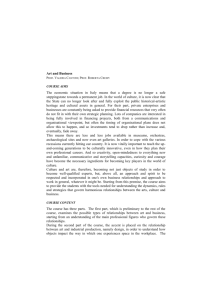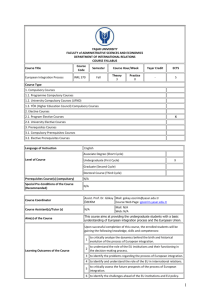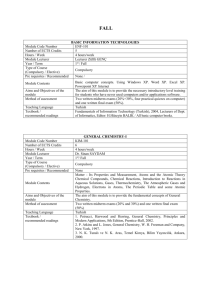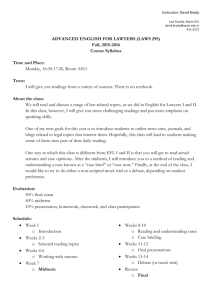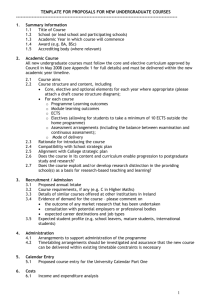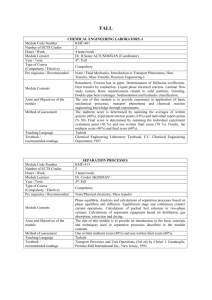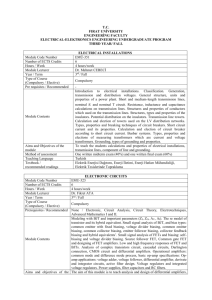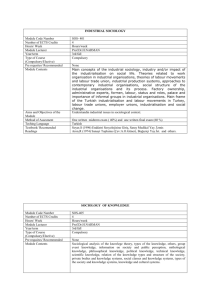1. Class
advertisement
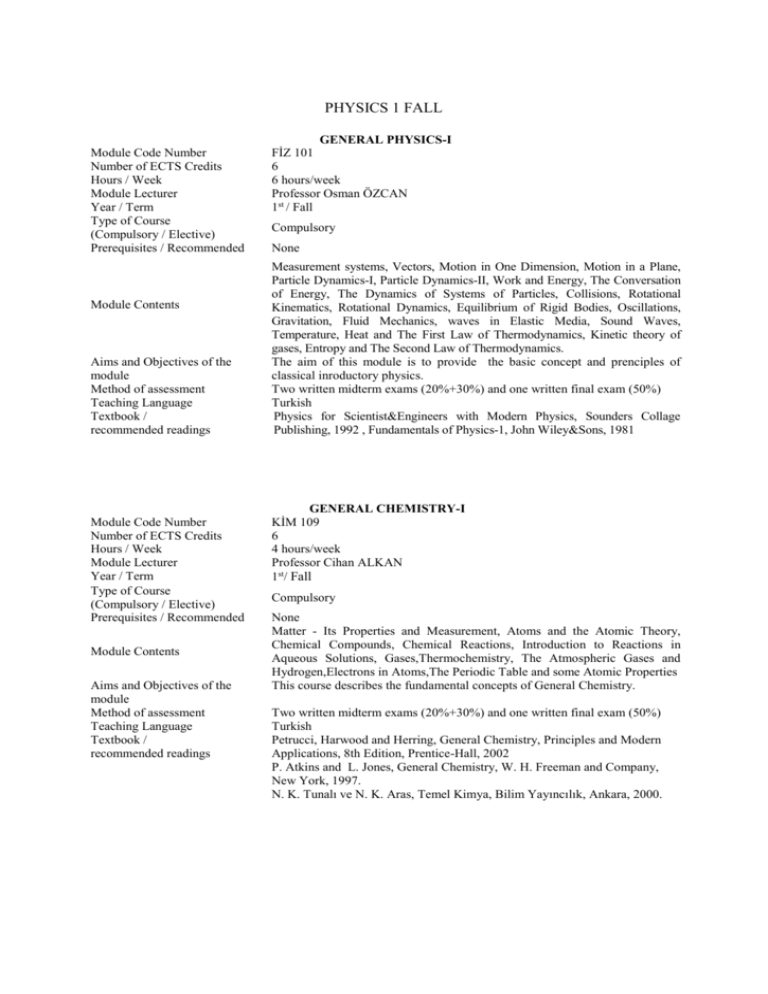
PHYSICS 1 FALL Module Code Number Number of ECTS Credits Hours / Week Module Lecturer Year / Term Type of Course (Compulsory / Elective) Prerequisites / Recommended Module Contents Aims and Objectives of the module Method of assessment Teaching Language Textbook / recommended readings Module Code Number Number of ECTS Credits Hours / Week Module Lecturer Year / Term Type of Course (Compulsory / Elective) Prerequisites / Recommended Module Contents Aims and Objectives of the module Method of assessment Teaching Language Textbook / recommended readings GENERAL PHYSICS-I FİZ 101 6 6 hours/week Professor Osman ÖZCAN 1st / Fall Compulsory None Measurement systems, Vectors, Motion in One Dimension, Motion in a Plane, Particle Dynamics-I, Particle Dynamics-II, Work and Energy, The Conversation of Energy, The Dynamics of Systems of Particles, Collisions, Rotational Kinematics, Rotational Dynamics, Equilibrium of Rigid Bodies, Oscillations, Gravitation, Fluid Mechanics, waves in Elastic Media, Sound Waves, Temperature, Heat and The First Law of Thermodynamics, Kinetic theory of gases, Entropy and The Second Law of Thermodynamics. The aim of this module is to provide the basic concept and prenciples of classical inroductory physics. Two written midterm exams (20%+30%) and one written final exam (50%) Turkish Physics for Scientist&Engineers with Modern Physics, Sounders Collage Publishing, 1992 , Fundamentals of Physics-1, John Wiley&Sons, 1981 GENERAL CHEMISTRY-I KİM 109 6 4 hours/week Professor Cihan ALKAN 1st/ Fall Compulsory None Matter - Its Properties and Measurement, Atoms and the Atomic Theory, Chemical Compounds, Chemical Reactions, Introduction to Reactions in Aqueous Solutions, Gases,Thermochemistry, The Atmospheric Gases and Hydrogen,Electrons in Atoms,The Periodic Table and some Atomic Properties This course describes the fundamental concepts of General Chemistry. Two written midterm exams (20%+30%) and one written final exam (50%) Turkish Petrucci, Harwood and Herring, General Chemistry, Principles and Modern Applications, 8th Edition, Prentice-Hall, 2002 P. Atkins and L. Jones, General Chemistry, W. H. Freeman and Company, New York, 1997. N. K. Tunalı ve N. K. Aras, Temel Kimya, Bilim Yayıncılık, Ankara, 2000. GENERAL PHYSICS LABORATORY (MECHANICS) Module Code Number FİZ-155 Number of ECTS Credits 5 Hours / Week 6 hours/week Module Lecturer Professor Yusuf ATICI Year / Term 1st/ Fall Type of Course Compulsory (Compulsory / Elective) Prerequisites / Recommended Ideal Gas Laws, Balance and Moment, The Expand Coefficient of Some Solid, The Expand Coefficient of Some Liquid, Simple Pendulum, Velocity Module Contents and Acceleration, The Calculating Coefficient of Some Springs, The Centrifugal Force Aims and Objectives of the The experiments will give you experience in applying the basic principles of module mechanics. Method of assessment Two written midterm exams (20%+30%) and one written final exam (50%) Teaching Language Turkish Textbook / Handouts, recommended readings Physics for Scientist&Engineers with Modern Physics, Sounders Collage Publishing, 1992 , Fundamentals of Physics-1, John Wiley&Sons, 1981 Module Code Number Number of ECTS Credits Hours / Week Module Lecturer Year / Term Type of Course (Compulsory / Elective) Prerequisites / Recommended Module Contents Aims and Objectives of the module Method of assessment Teaching Language Textbook / recommended readings GENERAL MATHEMATICS-I MAT-165 6 4 hours/week Lecturer Münevver AYDIN 1st / Fall Compulsory None / Mathematics-I Proof methods, Binomial formulae, Real numbers, Complex numbers, Matrices and determinants system of linear equation, Vectors and characteristic values of a matrices and corresponding characteristic vectors, Function and their types, basic elementary and algebraic functions, Limits of the functions, Continuity and the properties of the continuity functions. The aim of this lecture is to provide an introduction to the basic concepts and general techniques of the mathematics. Use this skill in the main branch of the engineering lectures. Two written midterm exams (20%+30%) and one written final exam (50%) Turkish Basic and General Mathematics I-II, Prof.Dr. H.Hilmi Hacısalihoğlu, Calculus, Prof. Dr. Mustafa BALCI, Linear Algebra, Prof.Dr. H.Hilmi Hacısalihoğlu. PHYSICS 1 SPRING Module Code Number Number of ECTS Credits Hours / Week Module Lecturer Year / Term Type of Course (Compulsory / Elective) Prerequisites / Recommended Module Contents Aims and Objectives of the module Method of assessment Teaching Language Textbook / recommended readings Module Code Number Number of ECTS Credits Hours / Week Module Lecturer Year / Term Type of Course (Compulsory / Elective) Prerequisites / Recommended Module Contents Aims and Objectives of the module Method of assessment Teaching Language Textbook / recommended readings GENERAL PHYSICS-II FİZ 102 6 6 hours/week Professor Osman ÖZCAN 1st / Spring Compulsory Charge and Matter, The Electric Field, Gauss’s Law, Electric Potential, Capacitors and Dielectrics, Current and Resistance, Electromotive Force and Circuits, The Magnetic Field, Ampere’s Law, Faraday’s Law, Inductance, Magnetic Properties of Matter, Electromagnetic Oscillations, Alternating Currents, Maxwell’s Equations, Electromagnetic Waves. The aim of this module is to provide the basic concept and prenciples of classical elecromagnetism. Two written midterm exams (20%+30%) and one written final exam (50%) Turkish Physics for Scientist&Engineers with Modern Physics, Sounders Collage Publishing, 1992 2) Fundamentals of Physics-2, John Wiley&Sons, 1981 GENERAL CHEMISTRY-II KİM 109 6 4 hours/week Associate Professor Ali ÖLÇÜCÜ 1st / Spring Compulsory Chemical Bonds I,Chemical Bonds II, Liquids, Solids and Intermolecular, Forces, Solutions and Physical Properties,Chemical Kinetic,Chemical Equilibrium,Acids and Bases,Acid – Base Equilibrium,Electrochimistry Nuclear Chemistry This course describes the fundamental concepts of General Chemistry Two written midterm exams (20%+30%) and one written final exam (50%) Turkish Petrucci, Harwood and Herring, General Chemistry, Principles and Modern Applications, 8th Edition, Prentice-Hall, 2002 P. Atkins and L. Jones, General Chemistry, W. H. Freeman and Company, New York, 1997. N. K. Tunalı ve N. K. Aras, Temel Kimya, Bilim Yayıncılık, Ankara, 2000. ENF 102 Basic Information Technologies Module Code Number Number of ECTS Credits Hours / Week Module Lecturer Year / Term Type of Course (Compulsory / Elective) Prerequisites / Recommended Module Contents Aims and Objectives of the module Method of assessment Teaching Language Textbook / recommended readings Module Code Number Number of ECTS Credits Hours / Week Module Lecturer Year / Term Type of Course (Compulsory / Elective) Prerequisites / Recommended Module Contents Aims and Objectives of the module Method of assessment Teaching Language Textbook / recommended readings PHYSICS LABORATORY-I FİZ-156 5 6 hours/week Professor Yusuf ATICI 1st / Spring Compulsory Velocity and Acceleration , Horizontal Shot, Newton’s Laws of Motion: Motion on inclined Plane, Elastic and Inelastic Collisions, Completely inelastic Collision, Simple Harmonic Motion, Conversation of Energy, Simple Pendulum and Measurement of Gravitational Acceleration, Damped Harmonic Motion The experiments will give you experience in applying the basic principles of mechanics. Two written midterm exams (20%+30%) and one written final exam (50%) Turkish Handouts, Physics for Scientist&Engineers with Modern Physics, Sounders Collage Publishing, 1992 , Fundamentals of Physics-2, John Wiley&Sons, 1981 GENERAL MATHEMATICS-II MAT-166 6 4 hours/week Lecturer Münevver AYDIN 1st / Spring Compulsory None /Mathematics-II Derivative and geometric meaning of derivative, derivative of the elementary functions, Differential properties and application of the approximate calculus, Derivatives of the inverse, closed and parametric functions, Higher order derivative and differential calculus, Applications of the Derivative: geometric meaning of derivative, tangent and normal distances, Infinitive graphs of the calculus and l'Hopital's rule, The extreme and asymptotes of the functions, Applications of derivative; drawing the graphs of the functions, Integrals and Applications of integrals, Binomial integral, integral of the trigonometric and hyperbolic functions, Applications of integration: area, volume The aim of this lecture is to provide an introduction to the basic concepts and general techniques of the mathematics. Use this skill in the main branch of the engineering lectures. Two written midterm exams (20%+30%) and one written final exam (50%) Turkish Basic and General Mathematics I-II, Prof.Dr. H.Hilmi Hacısalihoğlu, Calculus, Prof. Dr. Mustafa BALCI, Linear Algebra, Prof.Dr. H.Hilmi Hacısalihoğlu.
